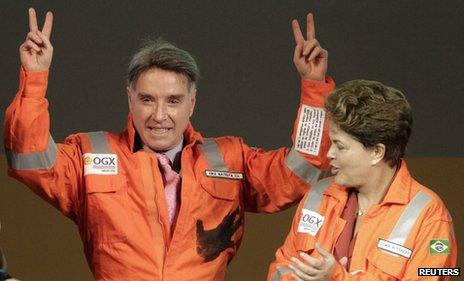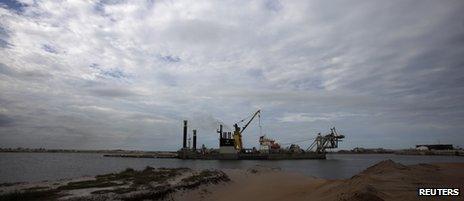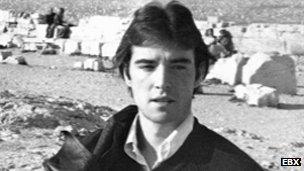Eike Batista, Brazil's fallen billionaire
- Published

Eike Batista's fortune made him one of Brazil's highest profile figures
Three years ago, Brazilian billionaire Eike Batista made a daring announcement: He warned the Mexican tycoon Carlos Slim that he intended to overtake him as the richest man on Earth.
"I told Carlos Slim that he should clean both of his rear mirrors, because I would not warn him on which side I was going to overtake him," he told the BBC then, with a grin.
He was the eighth richest man in the world according to Forbes. His business empire spanned oil, energy, ports and mining. It was growing fast, like the Brazilian economy at the time, with the arrival of the big demand for commodities from China.
Now things have dramatically changed for Mr Batista.
His EBX Group is highly in debt, the markets seem to have turned on him and his personal fortune has suffered a dramatic drop, going from $34bn to $2.9bn in just over a year.
Analysts believe his vast ambition may have been his undoing.
'Stereotypical salesman'
Mr Batista, the son of a former energy minister, became a millionaire at a very young age. He had returned to Brazil in the early 1980s after dropping out of a university in Germany, and started a business buying gold from suppliers in the Amazon and selling it to shopkeepers in Rio de Janeiro.
He went on to buy gold mines in Brazil and Canada and a silver mine in Chile, and soon became famous for his flamboyant lifestyle. He was fond of speed boats and married a former Playboy model.

Analysts believe Mr Batista is desperate to hold on to his Acu Superport
The transition from millionaire to billionaire happened in 2001, when he formed the EBX group out of six companies, mostly in the energy and maritime sectors. His firms benefited from China's enormous appetite for commodities.
Mr Batista's charisma, which he says was honed by his experience as an insurance policy salesman in his youth, was thought to be crucial in his companies' ability to attract investment.
"He fulfils the stereotype of a salesman when trying to get his projects financed and when it comes to attracting investors," says Sergio Lazzarini of the INSPER Business School in Sao Paulo.
In recent years Mr Batista became a key figure in Brazilian public life. His companies won huge public investment to carry out infrastructure projects.
No other city in Brazil felt Mr Batista's influence more than Rio de Janeiro. He carried out refurbishments on many landmarks in the city, and recently won a bid for the administration of the iconic Maracana stadium, where the 2014 World Cup final will be held.
Plane sold
But Brazil's economy has cooled in recent years, and foreign demand for commodities has dropped off.

In 1969 the Batista family uprooted to Europe, where Eike spent most of the 1970s
Investors became edgy last June when his oil company OGX announced that production had fallen below expected levels. OGX recently went on to say that it may now stop its activities in the Tubarao Azul oil field by 2014.
The firm, which was once seen as the jewel in the crown of his empire, lost 90% of its value in a year.
Mr Batista's business model "was exaggerated in every sense", says Mr Lazzarini. He says the firms built optimistic targets on unrealistic estimates.
"Businessmen tend to be optimistic by definition, but there was too much of that in this case," he says.
"It became very difficult for him to keep focus on several business areas."
EBX Group's shares have lost $60bn in value since peaking last year.
And market confidence was shaken even further last week when Mr Batista stepped down as head of the board of his energy company MPX, which is still seen as the best placed amid the current uncertainty.
Media reports suggest that MPX could be sold to raise money to pay off debts from other companies in the group, meaning he could lose control of the companies he founded.
Although he has even had to sell his plane, an Embraer Legacy, for $14m, Mr Batista remains defiant that he is capable of getting his business back on track.
How Mr Batista is dealing with his apparent failure to become richest man on Earth remains a mystery.
When asked about the issue, his son, Olin, a 17-year-old DJ, replied: "My father is sad seeing how the value of his shares is plummeting."
- Published14 May 2013
- Published25 November 2011
- Published9 March 2011